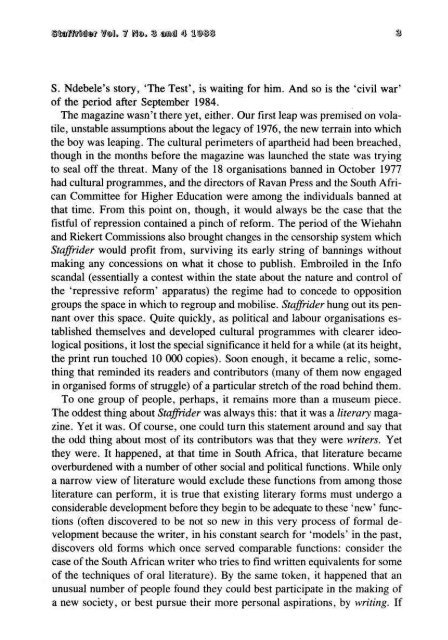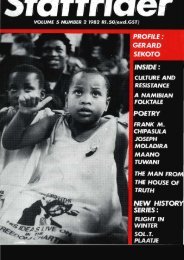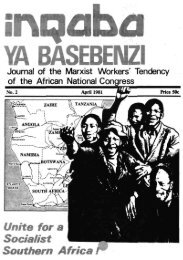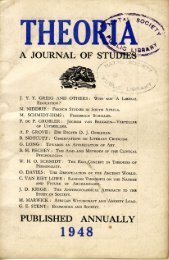- Page 1 and 2: TEN YEARS •:,§§I§f'-' 1978-198
- Page 3 and 4: © The contributors as listed on th
- Page 5 and 6: Contents Preface A.W. Oliphantllv'a
- Page 7 and 8: Time Has Run Out Mongane Serote 223
- Page 9 and 10: Preface Staffrider magazine, which
- Page 11 and 12: part in the development of document
- Page 13 and 14: etween these writers, their communi
- Page 15: § StafflfrMw w®a, i m. § ®®& 4
- Page 20 and 21: SMMtoi? Wri). 1 M®. 1 mmd 4 aD©§
- Page 22 and 23: StaKftfrOtiw W®aa 1 KJ(D- % ®m& 4
- Page 24 and 25: &$ My Friend, the Outcast Mtutuzeli
- Page 26 and 27: a4 SMMfcy Ws>Q. 1 K)®a ft mm® 4 a
- Page 28 and 29: m ^®mm®v WDH. i m®» $ mm® 4 aD
- Page 30 and 31: m §ttatffi7fl
- Page 32 and 33: n® either, to produce old Mrs Nyem
- Page 34 and 35: m %%wMiWm W®L 1 M®a § ®m® 4 ED
- Page 36 and 37: 14 §tatfMH
- Page 38 and 39: m
- Page 40 and 41: g© fftaffi(?B(i[l®Gr W®L 1 M®a
- Page 42 and 43: m StajfflMw MDII. ? Ki®a s uK(a 4
- Page 44 and 45: S3 SfcafMfe? MBIL ? M®, U amd) 4 E
- Page 46 and 47: U4 SftatfflrOdw WDO. f ®9
- Page 48 and 49: §© StariMdoor WDII. 1 Kl®, 3 aro
- Page 50 and 51: u© IfcuMtte W®L 1 M®» 3 m®
- Page 52 and 53: 4® S«?yy©Gr W®(L 1 M®a § siM
- Page 54 and 55: 42 §MM(to M&II. 1 M®a § ®(fl(3)
- Page 56 and 57: m ^mffivMm W®3a 1 Kl®a $ asa^ 4 a
- Page 58 and 59: M §MFMQ
- Page 60 and 61: m §MM
- Page 62 and 63: g® &W9MW W®L 1 Kl®, i mM 4 HD©
- Page 64 and 65: §i£ ^atWorBofl®!? W®L 1 M@a §
- Page 66 and 67:
m §KMMw W®L 1 (M®, 1 aofi}$ 4 ED
- Page 68 and 69:
§© §faifflfrl)(fl
- Page 70 and 71:
g® SttniNkrihdw WD9. ? M®, $ ®aa
- Page 72 and 73:
®(D Starffflrlkto V/®L 1 Kl®, $
- Page 74 and 75:
M MNMiiir WD(I. 7 M®a $ a@(3) 4 ED
- Page 76 and 77:
®4 SttafFMOw VoQ. ? M®» $ suiKd
- Page 78 and 79:
(3© 9WNMmt V®H. 1 853®. $ mm® 4
- Page 80 and 81:
m SMfaMmr V
- Page 82 and 83:
w §§®ffivMw Wl. 1 KJ®a $ aaa$ 4
- Page 84 and 85:
fS @tiatWi?IIaII
- Page 86 and 87:
?« ^a»8(^®y W®3. ? M®. 8 ®aa
- Page 88 and 89:
TO g&afMtoi? Vol), f M®a S ®m(£]
- Page 90 and 91:
n mmmmm w®a. i m®» i m® 4 aD©
- Page 92 and 93:
m Jobman Achmat Dangor QtaWirMtar V
- Page 94 and 95:
m 'Didn't he force her?' 'She didn'
- Page 96 and 97:
S
- Page 98 and 99:
§(g ^Mffioraoaw Von. ? No. $ aroaO
- Page 100 and 101:
§© StofflFMiir WDB. f M®, S finv
- Page 102 and 103:
D® §«?i?8(te M©D. ? M®a $ ®m(
- Page 104 and 105:
$2 SMfflrOtiw V®B. ^ KJ®, $ «MD^
- Page 106 and 107:
D4 ^atffiyy®? WDIL f M®» ft ®(n
- Page 108 and 109:
M iftaiMtot? W®(L ? Kl®, § ®m(a
- Page 110 and 111:
M ^sfflvMm W®L 1 M® U SUNGD 4 ED
- Page 112 and 113:
a®® ^foiiMtoi? ^®Q„ 1 M®» $
- Page 114 and 115:
&m §ftmfflvMw WL 1 W®» U mm® 4
- Page 116 and 117:
a®4 Ktatft?a
- Page 118 and 119:
M® §
- Page 120 and 121:
a®© ifcutftf^to W®L 1 M®a 3 mm
- Page 122 and 123:
aa® QtatflMktoir W®L 1 M®« 1 ®
- Page 124 and 125:
aa^ iftaffl?i?i)(3f]®i? ^®aa a Ki
- Page 126 and 127:
aM IftaffiiyllGa®!? W®L 1 K)®»
- Page 128 and 129:
aa® StarffflrMw WD8. 1 Kl®, S ®o
- Page 130 and 131:
HM SMMta? MDQ- f iM®» 1 Uffiii 4
- Page 132 and 133:
ag® swflfeMw WDH. i M®» i sunti
- Page 134 and 135:
ai>g KtaffflyB
- Page 136 and 137:
£24 §tt®{ffi?ii
- Page 138 and 139:
%$$ §MM&W MBQ. i M®, u wv& ^ mm b
- Page 140 and 141:
as® ©tofflirtdiOT ^/®a- ? Ki®a
- Page 142 and 143:
au© ©WNirlUllOT W®L 1 Kl®a % m$
- Page 144 and 145:
a$2 §&a»3(
- Page 146 and 147:
au4 §«M(^ W®0» f Kl®a a ameD 4
- Page 148 and 149:
as® Caroline Cullinan Mamlambo Bhe
- Page 150 and 151:
as© eftoMkrUtoor W®L H IN®. S &M
- Page 152 and 153:
M® SMMDw Moll. 1 K)®a 1 aradD 4 a
- Page 154 and 155:
114, @toifflirt
- Page 156 and 157:
nm SttarffflrlMw W®L 1 Kl®, i D^
- Page 158 and 159:
tm StafflrlMw Mall. ? Kl®. S fim^l
- Page 160 and 161:
nm ^ImtiMQw ^©B. f Kl®, U a^ ^ aD
- Page 162 and 163:
ai® StatfffrDtfw W®L 1 W®, S aro
- Page 164 and 165:
a@g StatfMdw MB>QB 1 M®a § amdl 4
- Page 166 and 167:
tm §§MrMw W®L 1 Kl®a D art 4 11
- Page 168 and 169:
a&® §farfffi?ll3ll®Gr W®h 1 m®
- Page 170 and 171:
tm ^isffiivMw W®3a 1 M®a % ®m& 4
- Page 172 and 173:
2®@ ^D»3(£]©y Mall, 1 m» U mm
- Page 174 and 175:
StafflfrMw WDII. 1 Kl®a 3 ®M 4 SI
- Page 176 and 177:
... '„.-.„-. Jimi Matthews Twen
- Page 179 and 180:
Judas Ngwenya Mayfair, Johannesburg
- Page 181 and 182:
Lesley Lawson Hostel scene
- Page 183 and 184:
Jeeva Rajgopaul
- Page 185 and 186:
Omar Badsha Migrant worker and his
- Page 187 and 188:
Wendy Schwegmann Hillbrow
- Page 189 and 190:
Guy Tillim Qwa-Qwa: Fetching water
- Page 191 and 192:
Santo Mofokeng
- Page 193 and 194:
a®® §$u»8(£]
- Page 195 and 196:
%m ftsffilvMw W®L 1 K)®a fJ m
- Page 197 and 198:
a?® SMM$
- Page 199 and 200:
Nineteen Seventy-Six Go nineteen se
- Page 201 and 202:
Starifflrftdw W®h 1 KJ®, S m®
- Page 203 and 204:
QMOIrlhddir Walk ^ M®» f* m® ®
- Page 205 and 206:
SttatfMftsi? MDIL ? K)®» U m® 4
- Page 207 and 208:
QtaifflrMMr WB. 1 Kl®a $ mM 4} aD
- Page 209 and 210:
^ a M ^ Vol), f K)®a 3 ®m
- Page 211 and 212:
9MHMW W* 1 M®» C mm® Q ED©© 1^
- Page 213 and 214:
SMfflri#»ir M©BB i M®, u ®G^ ®
- Page 215 and 216:
StartMIW W®L V KI®Q & ®m® ® aD
- Page 217 and 218:
§{taffiGrO
- Page 219 and 220:
©a. i m» § mm ® a®©® ^DS Lov
- Page 221 and 222:
StavTOrlMw ^/®a, 1 m®« § ®m®
- Page 223 and 224:
ttaWlritdw Wri). 1 M®* $ ®M 4 aD
- Page 225 and 226:
StaiffltoMItMr MDD. H KJ©» f* m®
- Page 227 and 228:
StavifflrlMiir W®L 1 M®a $ DG^ 4
- Page 229 and 230:
SWa-afc WDD. 1 Wm» % md 4 ED©§ J
- Page 231 and 232:
^ti®»y®? WDO. 1 m« S am*) 4 SID
- Page 233 and 234:
SSafficry®? W®h 1 M®» S mmd 4J
- Page 235 and 236:
StaffflrUtar WDH. 1 M®» $ m® 4 S
- Page 237 and 238:
SMMdwr W®Oa 1 M®» U mm® Q aD©
- Page 239 and 240:
§«?*©? V®II. i m®> u m® 4 nwm
- Page 241 and 242:
Era A. ? Ki®, $ and ^ aD©§ ^a& s
- Page 243 and 244:
^h>M(te Ws>Q0 1 K)®» U mm® 4 HD
- Page 245 and 246:
SIMMON 1 Wall. ? mm. i uradD 4 &§
- Page 247 and 248:
§«fM(0®[? WDQ. ? N®. $ ao^ ^ HD
- Page 249 and 250:
iUa»a
- Page 251 and 252:
§$a»ate Wl. T Kl®a s mm® 4 aD§
- Page 253 and 254:
SttfMryw W®L 1 KJ®a S mm® 4 ED©
- Page 255 and 256:
StaffflrDdto W©Q. 1 M®« $ and) 4
- Page 257 and 258:
BMMfcr MDII. 1 83®. $ sung) 4 UD§
- Page 259 and 260:
SMMW ^/®a. i m» a ®QR)(£1 4 aD
- Page 261 and 262:
liMf?^©? W®L f K)®a § m® 4 aD^
- Page 263 and 264:
9M9Mw V/®L 1 m» i mM 4 iD§§ Our
- Page 265 and 266:
S$stff?t?y®y W®L f M®, 1 ®(n$ 4
- Page 267 and 268:
SMftoMw MO. 1 M®, $ ®M 4 aDS© Th
- Page 269 and 270:
Stafflfrftdw WDI). 1 K)d>a 3 mm4 4
- Page 271:
§H®»y©y WDD. 1 m®* 3 mm® 4 HD
- Page 274 and 275:
%m msfflvMw WDB. 1 Kl(s>a 3 mm® ®
- Page 276 and 277:
m® m®mmm w. i M®» U amd 4 HD§
- Page 278 and 279:
m% Her husband stopped twisting his
- Page 280 and 281:
^§4 SMPylto W®IL 1 Kl®. U mm® 4
- Page 282 and 283:
i©i Except in Poems I Won't Look B
- Page 284 and 285:
%m Song of the Unemployed This room
- Page 286 and 287:
2
- Page 288 and 289:
m% Images grasped in the ghetto tha
- Page 290 and 291:
%m SMMrMw WDH. 1 M®, § SIEI^ 4 ED
- Page 292 and 293:
this city there is a moment in this
- Page 294 and 295:
^(g© §^»3(£)(ic? MDQ, 1 lM®a 8
- Page 296 and 297:
if® §tatffrB#w? ^/®aa i m®» u
- Page 298 and 299:
27$ VWtoMw WDII. ? Kl®, a am^ 4 HD
- Page 300 and 301:
S?4 raaffiGr5#»F WDH. H KI
- Page 302 and 303:
m m®nmm W®L H m®« s ao^ 4 HD©
- Page 304 and 305:
£78 3tiaitF(ftrOafl(W7 WL 1 mm. 3
- Page 306 and 307:
^^® StatffMflw WA 1 Kl®» U mmd 4
- Page 308 and 309:
m% mmmmm W©LI KI®» a ®m® 4 ILD
- Page 310 and 311:
%m TV at Auckland Park saying: Neve
- Page 312 and 313:
%m In These Days How often are we t
- Page 314 and 315:
%m m®U?Mm Wall. 1 K)®a i DIKE) 4
- Page 316 and 317:
nm Crossing the Desert This is the
- Page 318 and 319:
%m Johannesburg 100 The big city wh
- Page 320 and 321:
^D4 §
- Page 322 and 323:
iSaMta" MD!L 1 Kl®. % ®m& 4 aD§
- Page 324 and 325:
StatfMdw M©Ua f KJ®» $ ^$ 4 HD©
- Page 326 and 327:
iMftMte W®Qa 1 M®a § HQ^ ^ ED©
- Page 328 and 329:
SftaiMfc M®]. 1 Kl®, S ®m® 4 ED
- Page 330 and 331:
a««®i? VoO. f M®» 1 anxti 4 ED
- Page 332 and 333:
iMMte WBIL t M®« n ®m
- Page 334 and 335:
VtoMMtAmt W®H. 1 m®« S mm® 4 aD
- Page 336 and 337:
§MM$©(? Mall, f M®a U ®m® 4 ED
- Page 338 and 339:
§$atffir!lG[|®i? W®da H M®» %
- Page 340 and 341:
§«?F3(^[? WDD. 1 Kl®, § &[ft
- Page 342 and 343:
Stafflfrikfflwr W®L i IKI®. $ DQQ
- Page 344 and 345:
^$®iM$©(? WDH. 1 Kl®a S mm® 4J
- Page 346 and 347:
SMffiora^®!? W®L f Kl®, S na^ 4
- Page 348 and 349:
©ftfflffioraGfl®!? MDII. 1 m®»
- Page 350 and 351:
StMnrO^ii 1 WDB. 1 m®» $ wM ® ED
- Page 352 and 353:
©ti«OTlrfl#wr ^»» 1 Rl®. $ aao
- Page 354 and 355:
sttaffltriMw ^®a» ? Ki®a u ®m
- Page 356 and 357:
^afflfaBGfl©? W®L 1 M®a U aofiti
- Page 358 and 359:
©MFtfate W®L 1 M®» S mm® 4 t^m
- Page 360 and 361:
9WNMw WDD. 1 m* $ m® 4 aD©§ in j
- Page 362 and 363:
§tariffi?B
- Page 364 and 365:
StariffllrlMw W®L 1 M®» 1 m®*&
- Page 366 and 367:
§«?y3(g)
- Page 368 and 369:
StofflfrMlw ^®B. 1 N®. § mm® Q
- Page 370 and 371:
MfflrMtar WDO. 1 M®„ a mm® 4 aD
- Page 372 and 373:
staWMftGr w®aa i m®» i ®m& 4 mm
- Page 374 and 375:
S&afMtot? WDO. 1 Kl®. $ ®tB(a 4}
- Page 376 and 377:
U&l* dMMMdltir MDII. 7 Kto. ft auno
- Page 378 and 379:
^§4 SfatifflrflkftN' W®L 1 Kl®a
- Page 380 and 381:
$3$ SfafflMMw Ws>aa f M®, a asa^l
- Page 382 and 383:
Si© l&a»a(to WDH. 1 M®« S mm®
- Page 384 and 385:
UD® S$S)iM(te M&l). 1 K)®a © ®Q
- Page 386 and 387:
3®g ©
- Page 388 and 389:
Ud4i ^ftaiMtstes' W®L 1 R0®a f* m
- Page 390 and 391:
8
- Page 392 and 393:
§©D fflstfMtiw W®L 1 K)®a 8 amd
- Page 394 and 395:
s?
- Page 396 and 397:
m% §§MvMw Walk 1 Kl®a $ Dffi)^l
- Page 398 and 399:
IM SMfrlMw M©(L 1 M®» U ®m(& 4
- Page 400 and 401:
$m ^®ffi\?M®v W®L ? Kl®a U mm®
- Page 402 and 403:
are SMfrfltiw Vol). ^ K)®» a aaa^
- Page 404 and 405:
^©D §&a»ate w®Qa i m» § ®®(
- Page 406 and 407:
s©^ StaffflrMw ^©3. 1 M®, 3 amd
- Page 408 and 409:
m® ^®ff$vM®v Wall. 1 Kl®» $ ®
- Page 410 and 411:
U©(§ 9M9Mm MDII. 1 Ma S ®IR$ 4 &
- Page 412 and 413:
SMfflMtGr WDD. ? Kl®a § m® Q SID
- Page 414 and 415:
ttamrMMr Wall. 1 M®. 3 mm 4 aD§©
- Page 416 and 417:
@fta(fflrt
- Page 418 and 419:
SMrMto W®L 1 M®» 1 m® 4 aD©§
- Page 420 and 421:
SMrfrMw W®L.l Kl®, S mM 4 aD©§
- Page 422 and 423:
itfcafrfaBaiteff WoO. 1 m. $ mM
- Page 424 and 425:
SMtfMw WDO. ? Kl®, $ mm®
- Page 426 and 427:
tfMMte Ws>ll. 1 K)®a S m® ® ED©
- Page 428 and 429:
SMMdQ©? Wad. 1 K)®a $ SHMD 4 \%m
- Page 430 and 431:
Stafffiritiw WDD. 1 m®» $ mm® 4
- Page 432 and 433:
StaMrOdw MDO. 1 M®» § ©aa^ 4 2L
- Page 434 and 435:
1. 2. 3. 4. 5. 7. 8. 9. 10. 11. 12.
















